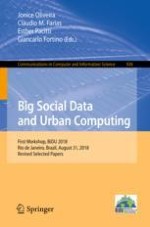2019 | Buch
Big Social Data and Urban Computing
First Workshop, BiDU 2018, Rio de Janeiro, Brazil, August 31, 2018, Revised Selected Papers
herausgegeben von: Jonice Oliveira, Claudio M. Farias, Dr. Esther Pacitti, Giancarlo Fortino
Verlag: Springer International Publishing
Buchreihe : Communications in Computer and Information Science
